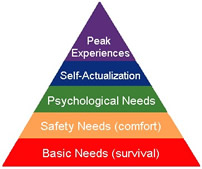Starting Out and Programming Yourself for Success |
|
What we feel and/or think about ourselves and our personal situation will impact our behavior. There is countless research regarding the power of our thoughts and how they can influence our physical, emotional, and psychological state of being. Read this article for more information. Great athletes spend equal time training their bodies as they do their minds. Why? Because half the battle is believing as to whether you can or cannot - self-esteem and attitude will impact the outcome. Self-esteem is your perception of how you view yourself and attitude is your strong belief toward people, things and situations - both will impact your performance. Your ability to find and pursue a career that will bring joy and fulfillment is within your reach but you must believe that it is possible, that you are able, capable, that you are responsible, resilient, and worthy. Your mind- set coupled with your actions will then set you in motion to carve out the future you envision. Being aware of your thoughts and belief systems will help you develop a mind set that can empower you and lead you toward your definition of success. Having a positive sense of self is paramount to engaging in career planning. Here's a brief set of questions developed by the National Association for Self Esteem that identifies current levels of self-esteem. For more information regarding self-esteem, please read this article. It is important that "true self-esteem" is not confused with conceit or arrogance. Part of your mind-set or outlook in life can be influenced by whether you believe you have control over your life or not - this is called locus of control. Please read this article to understand the concept and take this survey to determine your focus. Here's another survey option. Extremes on either end of the locus of control are not healthy. No one has total control over the environment or the future; one can only control ones effort, beliefs, and actions. If your current view of yourself, your life, or your future is bleak, I highly recommend that you seek out personal counseling services prior to engaging in career planning. Your mind-set, beliefs, and attitude will impact your view of your potential, your actions, and the eventual outcomes -this can be a positive or negative cycle. Become familiar with your strengths. Gardner's research on how people learn is remarkable. He proposes that we are all smart and we excel in particular ways. Review this web site where learning styles and multiple intelligence's are explained - do not complete the surveys on this site, they are not free. Here's a free online survey that can help you identify how you best learn. Here's also information regarding learning styles and how we process information referred to as Hemispheric Dominance (Left/Right Brain dominance). Understanding your strengths in how you learn will allow you to make better decisions regarding your learning and work environment. Go to Week 1 of the classroom and complete the assignments scheduled for this week. Do your best to pace yourself. Avoid posting your assignments at the last minute, it will remove the stress out of taking a summer course. |
